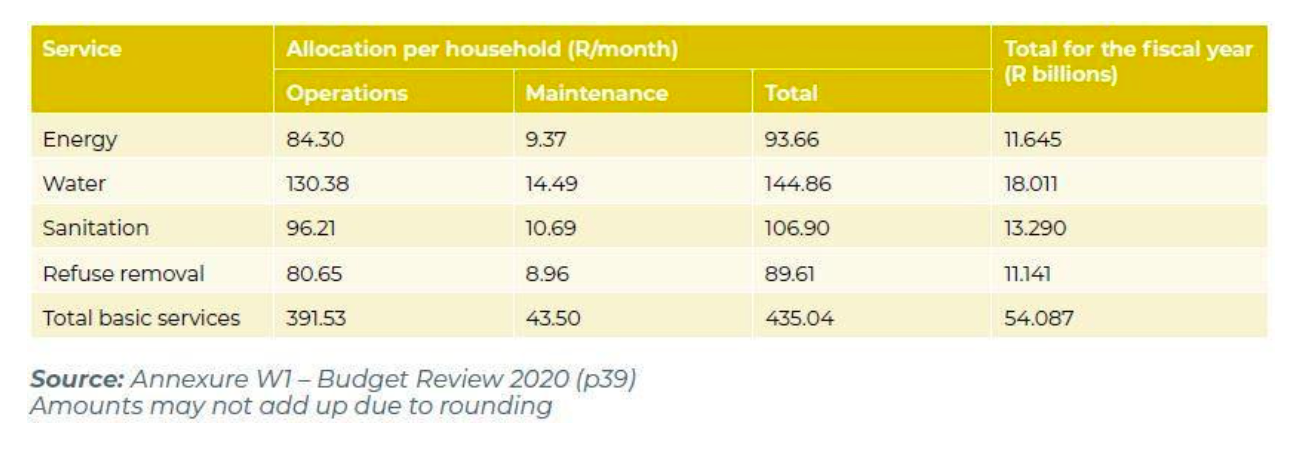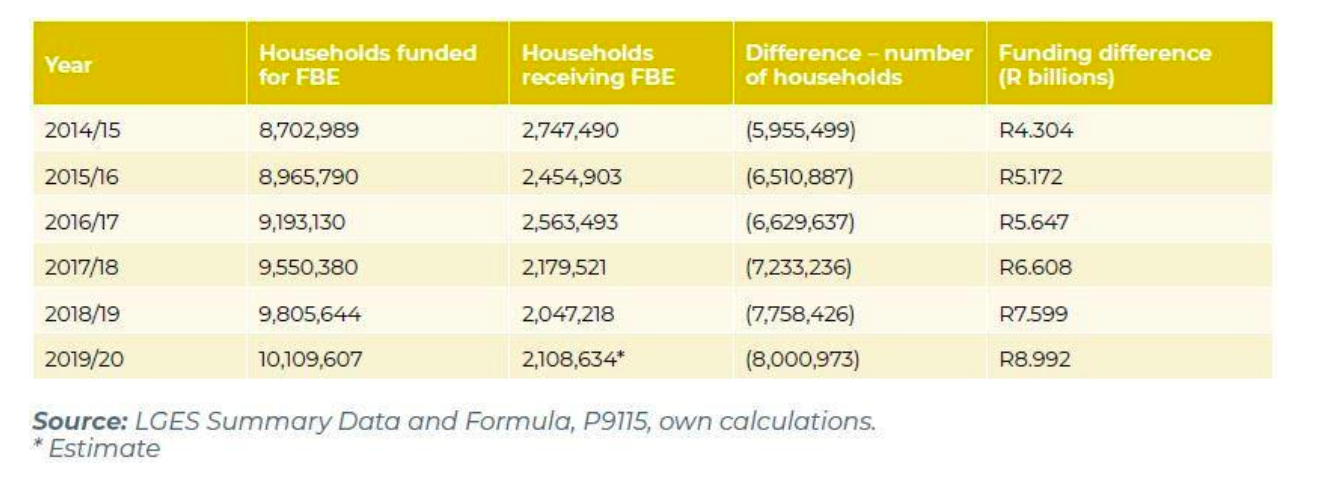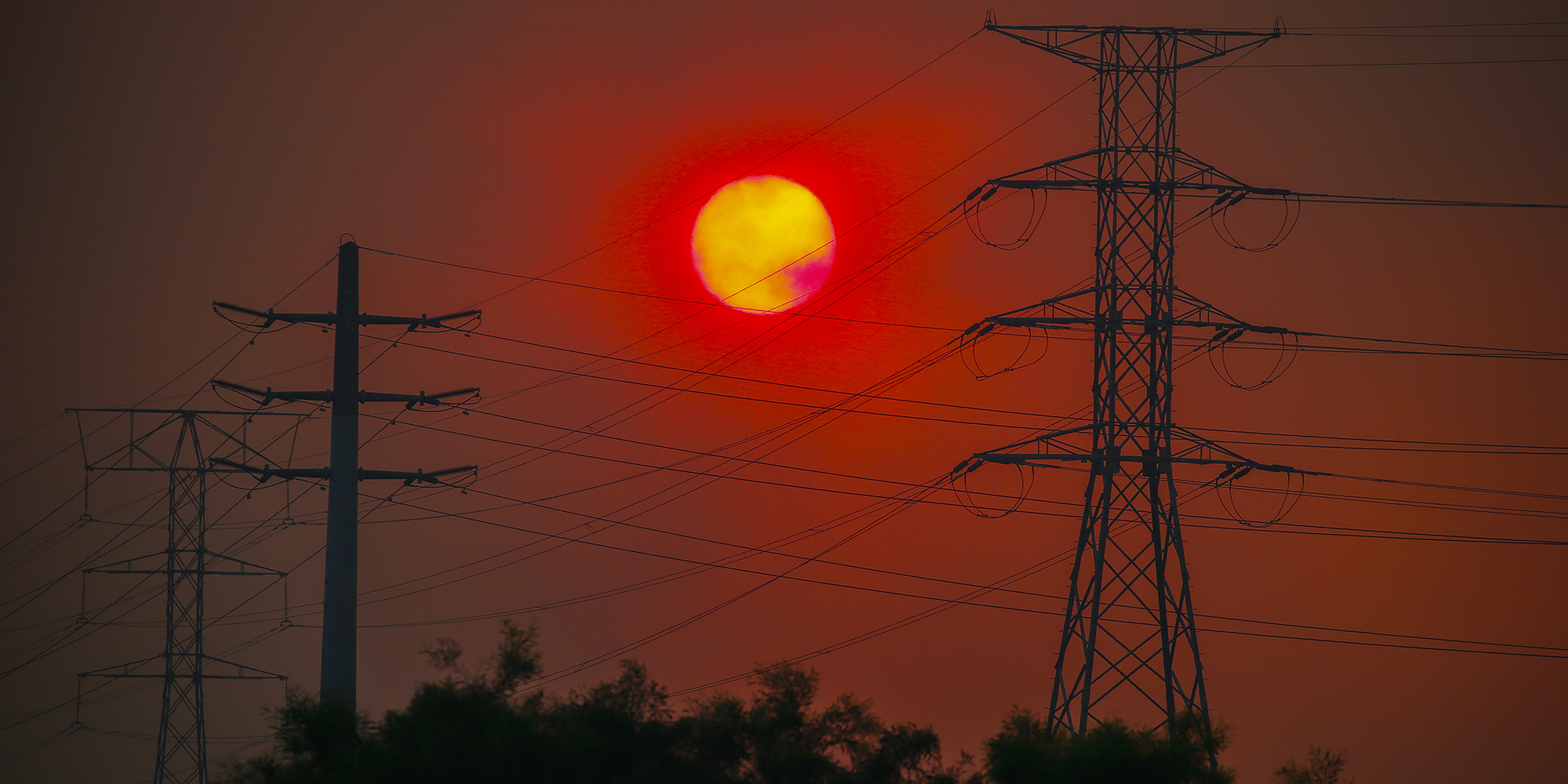All Article Properties:
{
"access_control": false,
"status": "publish",
"objectType": "Article",
"id": "915287",
"signature": "Article:915287",
"url": "https://staging.dailymaverick.co.za/article/2021-05-09-free-basic-electricity-for-the-poor-billions-in-funding-misappropriated-by-municipalities/",
"shorturl": "https://staging.dailymaverick.co.za/article/915287",
"slug": "free-basic-electricity-for-the-poor-billions-in-funding-misappropriated-by-municipalities",
"contentType": {
"id": "1",
"name": "Article",
"slug": "article"
},
"views": 0,
"comments": 8,
"preview_limit": null,
"excludedFromGoogleSearchEngine": 0,
"title": "Free basic electricity for the poor: Billions in funding misappropriated by municipalities",
"firstPublished": "2021-05-09 21:45:44",
"lastUpdate": "2021-05-09 21:45:44",
"categories": [
{
"id": "29",
"name": "South Africa",
"signature": "Category:29",
"slug": "south-africa",
"typeId": {
"typeId": "1",
"name": "Daily Maverick",
"slug": "",
"includeInIssue": "0",
"shortened_domain": "",
"stylesheetClass": "",
"domain": "staging.dailymaverick.co.za",
"articleUrlPrefix": "",
"access_groups": "[]",
"locale": "",
"preview_limit": null
},
"parentId": null,
"parent": [],
"image": "",
"cover": "",
"logo": "",
"paid": "0",
"objectType": "Category",
"url": "https://staging.dailymaverick.co.za/category/south-africa/",
"cssCode": "",
"template": "default",
"tagline": "",
"link_param": null,
"description": "Daily Maverick is an independent online news publication and weekly print newspaper in South Africa.\r\n\r\nIt is known for breaking some of the defining stories of South Africa in the past decade, including the Marikana Massacre, in which the South African Police Service killed 34 miners in August 2012.\r\n\r\nIt also investigated the Gupta Leaks, which won the 2019 Global Shining Light Award.\r\n\r\nThat investigation was credited with exposing the Indian-born Gupta family and former President Jacob Zuma for their role in the systemic political corruption referred to as state capture.\r\n\r\nIn 2018, co-founder and editor-in-chief Branislav ‘Branko’ Brkic was awarded the country’s prestigious Nat Nakasa Award, recognised for initiating the investigative collaboration after receiving the hard drive that included the email tranche.\r\n\r\nIn 2021, co-founder and CEO Styli Charalambous also received the award.\r\n\r\nDaily Maverick covers the latest political and news developments in South Africa with breaking news updates, analysis, opinions and more.",
"metaDescription": "",
"order": "0",
"pageId": null,
"articlesCount": null,
"allowComments": "1",
"accessType": "freecount",
"status": "1",
"children": [],
"cached": true
},
{
"id": "134172",
"name": "Maverick Citizen",
"signature": "Category:134172",
"slug": "maverick-citizen",
"typeId": {
"typeId": "1",
"name": "Daily Maverick",
"slug": "",
"includeInIssue": "0",
"shortened_domain": "",
"stylesheetClass": "",
"domain": "staging.dailymaverick.co.za",
"articleUrlPrefix": "",
"access_groups": "[]",
"locale": "",
"preview_limit": null
},
"parentId": null,
"parent": [],
"image": "",
"cover": "",
"logo": "",
"paid": "0",
"objectType": "Category",
"url": "https://staging.dailymaverick.co.za/category/maverick-citizen/",
"cssCode": "",
"template": "default",
"tagline": "",
"link_param": null,
"description": "",
"metaDescription": "",
"order": "0",
"pageId": null,
"articlesCount": null,
"allowComments": "1",
"accessType": "freecount",
"status": "1",
"children": [],
"cached": true
}
],
"content_length": 5916,
"contents": "<i><span style=\"font-weight: 400;\">Chris Yelland is managing director of EE Business Intelligence.</span></i>\r\n\r\n<span style=\"font-weight: 400;\">A new research report published by the </span><a href=\"https://pari.org.za/\"><span style=\"font-weight: 400;\">Public Affairs Research Institute</span></a><span style=\"font-weight: 400;\"> reveals that in the 2019/20 financial year alone, about R9-billion budgeted and disbursed by National Treasury to local government for the provision of free basic electricity (FBE) to the poorest of the poor has been misappropriated by municipalities.</span><b> </b>\r\n\r\n<span style=\"font-weight: 400;\">The report, </span><a href=\"https://47zhcvti0ul2ftip9rxo9fj9-wpengine.netdna-ssl.com/wp-content/uploads/2021/04/broken-promises21-04-21c.pdf\"><i><span style=\"font-weight: 400;\">Broken Promises: Electricity access for low-income households – good policy intentions, bad trade-offs and unintended consequences</span></i></a><span style=\"font-weight: 400;\">, by Dr Tracy Ledger, further shows that in the six financial years from 2014/15 to 2019/20, about R38.3-billion disbursed by National Treasury for FBE to indigent households failed to reach the intended recipients, and was instead used by municipalities for other unauthorised purposes. </span>\r\n\r\n<span style=\"font-weight: 400;\">This situation continues unabated, and is in fact worsening. “The number of households receiving the FBE benefit has generally declined over the past five years, while the number that is funded in the national budget has increased,” says Ledger in the report.</span>\r\n\r\n<span style=\"font-weight: 400;\">The </span><a href=\"http://www.energy.gov.za/files/policies/whitepaper_energypolicy_1998.pdf\"><span style=\"font-weight: 400;\">1998 Government White Paper on Energy Policy</span></a><span style=\"font-weight: 400;\"> clearly documents the government’s policy of universal access to electricity, and the provision of FBE to indigent households in South Africa, alongside other free basic services such as water, sanitation and refuse removal.</span>\r\n\r\n<span style=\"font-weight: 400;\">The research report by Ledger shows that a sum of R435.04 per indigent household per month, totalling about R54.1-billion for about 10.1 million indigent households, was calculated, budgeted and disbursed by the National Treasury to municipalities to fund free basic services in the 2020/21 financial year, as shown in Table 1.</span>\r\n\r\n<p><a href=\"https://www.dailymaverick.co.za/op-ed-yelland-pari-inset-1/\"><img loading=\"lazy\" class=\"size-full wp-image-915228\" src=\"https://www.dailymaverick.co.za/wp-content/uploads/2021/05/Op-Ed-Yelland-Pari-inset-1.png\" alt=\"\" width=\"1304\" height=\"453\" /></a> <i><span style=\"font-weight: 400;\">Amounts per basic service allocated through the Local Government Equitable Share, 2020/21.</span></i></p>\r\n\r\n<span style=\"font-weight: 400;\">However, the research report indicates that currently less than 30% of the 10.1 million indigent households that qualify for free basic services, and for which municipalities received the budgeted allocation of R54.1-billion in the 2020/21 financial year, actually received any free basic services. </span>\r\n\r\n<span style=\"font-weight: 400;\">Furthermore, in the case of free basic electricity, only some 21% of the 10.1 million qualifying indigent households actually received FBE in the 2019/20 financial year, and only 21% of the R11.4-billion disbursed by National Treasury to municipalities for FBE was actually used by municipalities for the intended purpose, as shown in Table 2.</span>\r\n\r\n<p><a href=\"https://www.dailymaverick.co.za/op-ed-yelland-pari-inset-2/\"><img loading=\"lazy\" class=\"size-full wp-image-915230\" src=\"https://www.dailymaverick.co.za/wp-content/uploads/2021/05/Op-Ed-Yelland-Pari-inset-2.png\" alt=\"\" width=\"1318\" height=\"484\" /></a> <i><span style=\"font-weight: 400;\">Households receiving FBE versus households funded for FBE</span></i>.</p>\r\n\r\n<span style=\"font-weight: 400;\">This has occurred in the face of rapidly rising electricity prices from Eskom, and much higher prices of electricity supplied by municipal electricity distributors, and serves to significantly increase levels of poverty in South Africa. </span>\r\n\r\n<span style=\"font-weight: 400;\">In terms of the government’s FBE policy, qualifying indigent households may receive 50kWh of electricity free of charge per month. The majority of indigent households are in Eskom areas of electricity supply, while the remainder are in areas supplied by municipal electricity distributors. However, even in Eskom areas of supply, access by poor households to the FBE energy allowance is still controlled by municipalities.</span>\r\n\r\n<span style=\"font-weight: 400;\">“Local government is the gatekeeper of the free basic services programme (including FBE) and is the final arbiter of who can access these and who cannot. In terms of that policy, it is each municipality’s responsibility to identify households within its boundaries that qualify for indigent status, to keep a record of such households, and to then ensure that they receive the free basic services,” says Ledger.</span>\r\n\r\n<span style=\"font-weight: 400;\">Municipalities are not required to fund the provision of free basic services, including the 50kWh of FBE, from their own revenue. Instead, there is an annual allocation in the national Budget to each municipality in respect of these services, through the Local Government Equitable Share, which is disbursed by National Treasury from the fiscus. </span>\r\n\r\n<span style=\"font-weight: 400;\">However, a </span><a href=\"https://www.seri-sa.org/images/Targeting_the_Poor_Nov13.pdf\"><span style=\"font-weight: 400;\">2013 study by the Socio-Economic Rights Institute of South Africa</span></a><span style=\"font-weight: 400;\"> (Seri) found that municipalities have generally put in place unworkable and bureaucratic processes which make access to FBE by indigent households extremely difficult. The study suggests that municipalities are not attempting to provide free basic services to as many households as possible, but rather to restrict access.</span>\r\n\r\n<span style=\"font-weight: 400;\">This failure to provide free basic services and FBE to indigent households reflects negatively on the relevant national government structures that set these policies, such the departments of Mineral Resources and Energy, Public Enterprises, and Cooperative Governance and Traditional Affairs.</span>\r\n\r\n<span style=\"font-weight: 400;\">Furthermore, the failure to ensure that these funds, calculated, budgeted and disbursed for poverty relief, actually reach the intended recipients reflects very poorly on various bodies such as Parliament and its Standing Committee on Public Accounts, National Treasury and the Auditor-General, which are supposed to provide oversight in respect of public expenditure.</span>\r\n\r\n<span style=\"font-weight: 400;\">Finally, the failure to deliver free basic services and FBE to indigent households also reflects badly on government agencies, state-owned enterprises and industry associations, such as the National Energy Regulator of South Africa, Eskom, the South African Local Government Association and the Association of Municipal Electricity Utilities of Southern Africa, which are responsible for implementing government policy.</span>\r\n\r\n<span style=\"font-weight: 400;\">“The evidence suggests a conclusion that supports Seri’s 2013 finding: municipalities are deliberately making it difficult for indigent households to access free basic services because there is a financial incentive for them to do so, and because there is no one to prevent them from doing so,” says Ledger. </span><b>DM</b>\r\n\r\n<i><span style=\"font-weight: 400;\">Copyright 2021 – EE Business Intelligence (Pty) Ltd. All rights reserved. This article may not be published without the written permission of EE Business Intelligence.</span></i>",
"teaser": "Free basic electricity for the poor: Billions in funding misappropriated by municipalities",
"externalUrl": "",
"sponsor": null,
"authors": [
{
"id": "141",
"name": "Chris Yelland",
"image": "https://www.dailymaverick.co.za/wp-content/uploads/chris-yelland-column-photo.jpg",
"url": "https://staging.dailymaverick.co.za/author/chrisyelland/",
"editorialName": "chrisyelland",
"department": "",
"name_latin": ""
}
],
"description": "",
"keywords": [
{
"type": "Keyword",
"data": {
"keywordId": "2741",
"name": "Eskom",
"url": "https://staging.dailymaverick.co.za/keyword/eskom/",
"slug": "eskom",
"description": "Eskom is the primary electricity supplier and generator of power in South Africa. It is a state-owned enterprise that was established in 1923 as the Electricity Supply Commission (ESCOM) and later changed its name to Eskom. The company is responsible for generating, transmitting, and distributing electricity to the entire country, and it is one of the largest electricity utilities in the world, supplying about 90% of the country's electricity needs. It generates roughly 30% of the electricity used\r\nin Africa.\r\n\r\nEskom operates a variety of power stations, including coal-fired, nuclear, hydro, and renewable energy sources, and has a total installed capacity of approximately 46,000 megawatts. The company is also responsible for maintaining the electricity grid infrastructure, which includes power lines and substations that distribute electricity to consumers.\r\n\r\nEskom plays a critical role in the South African economy, providing electricity to households, businesses, and industries, and supporting economic growth and development. However, the company has faced several challenges in recent years, including financial difficulties, aging infrastructure, and operational inefficiencies, which have led to power outages and load shedding in the country.\r\n\r\nDaily Maverick has reported on this extensively, including its recently published investigations from the Eskom Intelligence Files which demonstrated extensive sabotage at the power utility. Intelligence reports obtained by Daily Maverick linked two unnamed senior members of President Cyril Ramaphosa’s Cabinet to four criminal cartels operating inside Eskom. The intelligence links the cartels to the sabotage of Eskom’s power stations and to a programme of political destabilisation which has contributed to the current power crisis.",
"articlesCount": 0,
"replacedWith": null,
"display_name": "Eskom",
"translations": null
}
},
{
"type": "Keyword",
"data": {
"keywordId": "8213",
"name": "National Treasury",
"url": "https://staging.dailymaverick.co.za/keyword/national-treasury/",
"slug": "national-treasury",
"description": "",
"articlesCount": 0,
"replacedWith": null,
"display_name": "National Treasury",
"translations": null
}
},
{
"type": "Keyword",
"data": {
"keywordId": "157909",
"name": "Salga",
"url": "https://staging.dailymaverick.co.za/keyword/salga/",
"slug": "salga",
"description": "",
"articlesCount": 0,
"replacedWith": null,
"display_name": "Salga",
"translations": null
}
},
{
"type": "Keyword",
"data": {
"keywordId": "351096",
"name": "free basic electricity",
"url": "https://staging.dailymaverick.co.za/keyword/free-basic-electricity/",
"slug": "free-basic-electricity",
"description": "",
"articlesCount": 0,
"replacedWith": null,
"display_name": "free basic electricity",
"translations": null
}
}
],
"short_summary": null,
"source": null,
"related": [],
"options": [],
"attachments": [
{
"id": "92514",
"name": "tyru",
"description": "<i><span style=\"font-weight: 400;\">Chris Yelland is managing director of EE Business Intelligence.</span></i>\r\n\r\n<span style=\"font-weight: 400;\">A new research report published by the </span><a href=\"https://pari.org.za/\"><span style=\"font-weight: 400;\">Public Affairs Research Institute</span></a><span style=\"font-weight: 400;\"> reveals that in the 2019/20 financial year alone, about R9-billion budgeted and disbursed by National Treasury to local government for the provision of free basic electricity (FBE) to the poorest of the poor has been misappropriated by municipalities.</span><b> </b>\r\n\r\n<span style=\"font-weight: 400;\">The report, </span><a href=\"https://47zhcvti0ul2ftip9rxo9fj9-wpengine.netdna-ssl.com/wp-content/uploads/2021/04/broken-promises21-04-21c.pdf\"><i><span style=\"font-weight: 400;\">Broken Promises: Electricity access for low-income households – good policy intentions, bad trade-offs and unintended consequences</span></i></a><span style=\"font-weight: 400;\">, by Dr Tracy Ledger, further shows that in the six financial years from 2014/15 to 2019/20, about R38.3-billion disbursed by National Treasury for FBE to indigent households failed to reach the intended recipients, and was instead used by municipalities for other unauthorised purposes. </span>\r\n\r\n<span style=\"font-weight: 400;\">This situation continues unabated, and is in fact worsening. “The number of households receiving the FBE benefit has generally declined over the past five years, while the number that is funded in the national budget has increased,” says Ledger in the report.</span>\r\n\r\n<span style=\"font-weight: 400;\">The </span><a href=\"http://www.energy.gov.za/files/policies/whitepaper_energypolicy_1998.pdf\"><span style=\"font-weight: 400;\">1998 Government White Paper on Energy Policy</span></a><span style=\"font-weight: 400;\"> clearly documents the government’s policy of universal access to electricity, and the provision of FBE to indigent households in South Africa, alongside other free basic services such as water, sanitation and refuse removal.</span>\r\n\r\n<span style=\"font-weight: 400;\">The research report by Ledger shows that a sum of R435.04 per indigent household per month, totalling about R54.1-billion for about 10.1 million indigent households, was calculated, budgeted and disbursed by the National Treasury to municipalities to fund free basic services in the 2020/21 financial year, as shown in Table 1.</span>\r\n\r\n[caption id=\"attachment_915228\" align=\"alignnone\" width=\"1304\"]<a href=\"https://www.dailymaverick.co.za/op-ed-yelland-pari-inset-1/\"><img class=\"size-full wp-image-915228\" src=\"https://www.dailymaverick.co.za/wp-content/uploads/2021/05/Op-Ed-Yelland-Pari-inset-1.png\" alt=\"\" width=\"1304\" height=\"453\" /></a> <i><span style=\"font-weight: 400;\">Amounts per basic service allocated through the Local Government Equitable Share, 2020/21.</span></i>[/caption]\r\n\r\n<span style=\"font-weight: 400;\">However, the research report indicates that currently less than 30% of the 10.1 million indigent households that qualify for free basic services, and for which municipalities received the budgeted allocation of R54.1-billion in the 2020/21 financial year, actually received any free basic services. </span>\r\n\r\n<span style=\"font-weight: 400;\">Furthermore, in the case of free basic electricity, only some 21% of the 10.1 million qualifying indigent households actually received FBE in the 2019/20 financial year, and only 21% of the R11.4-billion disbursed by National Treasury to municipalities for FBE was actually used by municipalities for the intended purpose, as shown in Table 2.</span>\r\n\r\n[caption id=\"attachment_915230\" align=\"alignnone\" width=\"1318\"]<a href=\"https://www.dailymaverick.co.za/op-ed-yelland-pari-inset-2/\"><img class=\"size-full wp-image-915230\" src=\"https://www.dailymaverick.co.za/wp-content/uploads/2021/05/Op-Ed-Yelland-Pari-inset-2.png\" alt=\"\" width=\"1318\" height=\"484\" /></a> <i><span style=\"font-weight: 400;\">Households receiving FBE versus households funded for FBE</span></i>.[/caption]\r\n\r\n<span style=\"font-weight: 400;\">This has occurred in the face of rapidly rising electricity prices from Eskom, and much higher prices of electricity supplied by municipal electricity distributors, and serves to significantly increase levels of poverty in South Africa. </span>\r\n\r\n<span style=\"font-weight: 400;\">In terms of the government’s FBE policy, qualifying indigent households may receive 50kWh of electricity free of charge per month. The majority of indigent households are in Eskom areas of electricity supply, while the remainder are in areas supplied by municipal electricity distributors. However, even in Eskom areas of supply, access by poor households to the FBE energy allowance is still controlled by municipalities.</span>\r\n\r\n<span style=\"font-weight: 400;\">“Local government is the gatekeeper of the free basic services programme (including FBE) and is the final arbiter of who can access these and who cannot. In terms of that policy, it is each municipality’s responsibility to identify households within its boundaries that qualify for indigent status, to keep a record of such households, and to then ensure that they receive the free basic services,” says Ledger.</span>\r\n\r\n<span style=\"font-weight: 400;\">Municipalities are not required to fund the provision of free basic services, including the 50kWh of FBE, from their own revenue. Instead, there is an annual allocation in the national Budget to each municipality in respect of these services, through the Local Government Equitable Share, which is disbursed by National Treasury from the fiscus. </span>\r\n\r\n<span style=\"font-weight: 400;\">However, a </span><a href=\"https://www.seri-sa.org/images/Targeting_the_Poor_Nov13.pdf\"><span style=\"font-weight: 400;\">2013 study by the Socio-Economic Rights Institute of South Africa</span></a><span style=\"font-weight: 400;\"> (Seri) found that municipalities have generally put in place unworkable and bureaucratic processes which make access to FBE by indigent households extremely difficult. The study suggests that municipalities are not attempting to provide free basic services to as many households as possible, but rather to restrict access.</span>\r\n\r\n<span style=\"font-weight: 400;\">This failure to provide free basic services and FBE to indigent households reflects negatively on the relevant national government structures that set these policies, such the departments of Mineral Resources and Energy, Public Enterprises, and Cooperative Governance and Traditional Affairs.</span>\r\n\r\n<span style=\"font-weight: 400;\">Furthermore, the failure to ensure that these funds, calculated, budgeted and disbursed for poverty relief, actually reach the intended recipients reflects very poorly on various bodies such as Parliament and its Standing Committee on Public Accounts, National Treasury and the Auditor-General, which are supposed to provide oversight in respect of public expenditure.</span>\r\n\r\n<span style=\"font-weight: 400;\">Finally, the failure to deliver free basic services and FBE to indigent households also reflects badly on government agencies, state-owned enterprises and industry associations, such as the National Energy Regulator of South Africa, Eskom, the South African Local Government Association and the Association of Municipal Electricity Utilities of Southern Africa, which are responsible for implementing government policy.</span>\r\n\r\n<span style=\"font-weight: 400;\">“The evidence suggests a conclusion that supports Seri’s 2013 finding: municipalities are deliberately making it difficult for indigent households to access free basic services because there is a financial incentive for them to do so, and because there is no one to prevent them from doing so,” says Ledger. </span><b>DM</b>\r\n\r\n<i><span style=\"font-weight: 400;\">Copyright 2021 – EE Business Intelligence (Pty) Ltd. All rights reserved. This article may not be published without the written permission of EE Business Intelligence.</span></i>",
"focal": "50% 50%",
"width": 0,
"height": 0,
"url": "https://dmcdn.whitebeard.net/dailymaverick/wp-content/uploads/2021/05/Op-Ed-Yelland-Pari-option-1.jpg",
"transforms": [
{
"x": "200",
"y": "100",
"url": "https://dmcdn.whitebeard.net/i/OtoeYY1Q8AwM_2edu1w2rOC9TiE=/200x100/smart/filters:strip_exif()/file/dailymaverick/wp-content/uploads/2021/05/Op-Ed-Yelland-Pari-option-1.jpg"
},
{
"x": "450",
"y": "0",
"url": "https://dmcdn.whitebeard.net/i/GSLMk2UqCoTYii58FmTE8dTKqzE=/450x0/smart/file/dailymaverick/wp-content/uploads/2021/05/Op-Ed-Yelland-Pari-option-1.jpg"
},
{
"x": "800",
"y": "0",
"url": "https://dmcdn.whitebeard.net/i/x87QUulDCU_z81SODEcuHWrU-ZI=/800x0/smart/filters:strip_exif()/file/dailymaverick/wp-content/uploads/2021/05/Op-Ed-Yelland-Pari-option-1.jpg"
},
{
"x": "1200",
"y": "0",
"url": "https://dmcdn.whitebeard.net/i/NC2_2ojeuRH6k6PDJfzp4Y6zZFw=/1200x0/smart/filters:strip_exif()/file/dailymaverick/wp-content/uploads/2021/05/Op-Ed-Yelland-Pari-option-1.jpg"
},
{
"x": "1600",
"y": "0",
"url": "https://dmcdn.whitebeard.net/i/8Y2sQ_uBCjzvnITXJGcRZBRCiSE=/1600x0/smart/filters:strip_exif()/file/dailymaverick/wp-content/uploads/2021/05/Op-Ed-Yelland-Pari-option-1.jpg"
}
],
"url_thumbnail": "https://dmcdn.whitebeard.net/i/OtoeYY1Q8AwM_2edu1w2rOC9TiE=/200x100/smart/filters:strip_exif()/file/dailymaverick/wp-content/uploads/2021/05/Op-Ed-Yelland-Pari-option-1.jpg",
"url_medium": "https://dmcdn.whitebeard.net/i/GSLMk2UqCoTYii58FmTE8dTKqzE=/450x0/smart/file/dailymaverick/wp-content/uploads/2021/05/Op-Ed-Yelland-Pari-option-1.jpg",
"url_large": "https://dmcdn.whitebeard.net/i/x87QUulDCU_z81SODEcuHWrU-ZI=/800x0/smart/filters:strip_exif()/file/dailymaverick/wp-content/uploads/2021/05/Op-Ed-Yelland-Pari-option-1.jpg",
"url_xl": "https://dmcdn.whitebeard.net/i/NC2_2ojeuRH6k6PDJfzp4Y6zZFw=/1200x0/smart/filters:strip_exif()/file/dailymaverick/wp-content/uploads/2021/05/Op-Ed-Yelland-Pari-option-1.jpg",
"url_xxl": "https://dmcdn.whitebeard.net/i/8Y2sQ_uBCjzvnITXJGcRZBRCiSE=/1600x0/smart/filters:strip_exif()/file/dailymaverick/wp-content/uploads/2021/05/Op-Ed-Yelland-Pari-option-1.jpg",
"type": "image"
}
],
"summary": "Misappropriation of funds has occurred in the face of rapidly rising electricity prices from Eskom, and much higher prices of electricity supplied by municipal electricity distributors, and serves to significantly increase levels of poverty in South Africa.\r\n",
"template_type": null,
"dm_custom_section_label": null,
"elements": [],
"seo": {
"search_title": "Free basic electricity for the poor: Billions in funding misappropriated by municipalities",
"search_description": "<i><span style=\"font-weight: 400;\">Chris Yelland is managing director of EE Business Intelligence.</span></i>\r\n\r\n<span style=\"font-weight: 400;\">A new research report published by the </span><a href=\"",
"social_title": "Free basic electricity for the poor: Billions in funding misappropriated by municipalities",
"social_description": "<i><span style=\"font-weight: 400;\">Chris Yelland is managing director of EE Business Intelligence.</span></i>\r\n\r\n<span style=\"font-weight: 400;\">A new research report published by the </span><a href=\"",
"social_image": ""
},
"cached": true,
"access_allowed": true
}  Amounts per basic service allocated through the Local Government Equitable Share, 2020/21.
Amounts per basic service allocated through the Local Government Equitable Share, 2020/21. Households receiving FBE versus households funded for FBE.
Households receiving FBE versus households funded for FBE.




